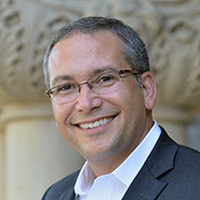9 Essential Practices to Make College Pay Off
One of the biggest investments families make is the money they spend on college. Here are nine things college students should do during their school years to help ensure the best return on that investment.


Profit and prosper with the best of Kiplinger's advice on investing, taxes, retirement, personal finance and much more. Delivered daily. Enter your email in the box and click Sign Me Up.
You are now subscribed
Your newsletter sign-up was successful
Want to add more newsletters?

Delivered daily
Kiplinger Today
Profit and prosper with the best of Kiplinger's advice on investing, taxes, retirement, personal finance and much more delivered daily. Smart money moves start here.

Sent five days a week
Kiplinger A Step Ahead
Get practical help to make better financial decisions in your everyday life, from spending to savings on top deals.

Delivered daily
Kiplinger Closing Bell
Get today's biggest financial and investing headlines delivered to your inbox every day the U.S. stock market is open.

Sent twice a week
Kiplinger Adviser Intel
Financial pros across the country share best practices and fresh tactics to preserve and grow your wealth.

Delivered weekly
Kiplinger Tax Tips
Trim your federal and state tax bills with practical tax-planning and tax-cutting strategies.

Sent twice a week
Kiplinger Retirement Tips
Your twice-a-week guide to planning and enjoying a financially secure and richly rewarding retirement

Sent bimonthly.
Kiplinger Adviser Angle
Insights for advisers, wealth managers and other financial professionals.

Sent twice a week
Kiplinger Investing Weekly
Your twice-a-week roundup of promising stocks, funds, companies and industries you should consider, ones you should avoid, and why.

Sent weekly for six weeks
Kiplinger Invest for Retirement
Your step-by-step six-part series on how to invest for retirement, from devising a successful strategy to exactly which investments to choose.
Many parents and students wading through college applications this fall are experiencing sticker shock. Couple that with 44 million Americans owing $1.5 trillion in student loan debt and anyone can see why there are growing concerns about the cost and value of a college education.
But there is consistent and compelling evidence that earning a college degree still remains the best path to improve one’s job prospects. It’s a fact that college graduates earn on average 84% more over their lifetimes than high school graduates.
The question is not whether college is worth it but rather, how do students get the most from their investment, especially with an eye toward building a post-college career?
From just $107.88 $24.99 for Kiplinger Personal Finance
Become a smarter, better informed investor. Subscribe from just $107.88 $24.99, plus get up to 4 Special Issues

Sign up for Kiplinger’s Free Newsletters
Profit and prosper with the best of expert advice on investing, taxes, retirement, personal finance and more - straight to your e-mail.
Profit and prosper with the best of expert advice - straight to your e-mail.
I believe families need a road map. Let me offer nine essentials for maximizing the return on your tuition dollars:
1. Embrace academic courses.
Whether studying Shakespeare or statistics (or hopefully both), academic work must be the centerpiece of any student’s college experience. It may seem like simple advice, but far too many students take the path of least resistance and/or take classes in one narrow corner of the college. This is the time to be rigorous. Sign up for a wide range of challenging classes and take advantage of being fully engaged in each of them. Find joy and power in the books you read, the classes you attend and the papers you write. This should be priority one.
2. Choose co-curricular activities wisely.
Co-curricular activities, like student organizations, student government, campus newspapers, athletics and arts organizations, offer fun and learning, but students tend to get overly involved or not involved at all. Get involved in something you are already interested in, and stretch yourself by pursuing a new interest. Remember, learning comes to those who value depth, commitment and excellence — not just keeping busy.
3. Make room for cultural and intellectual events.
Lectures, plays, concerts, art openings and panel conversations are just a few of the extraordinary events that fill college campuses. Too many students don’t take advantage of the range of cultural and intellectual events to expand their minds, imagination and world views. In particular, attend events that will challenge your existing opinions and tastes. This will prepare you to excel in the world of work as well.
4. Explore careers early.
College should help you develop ideas for the kind of life you want to live, give you an understanding of how careers allow people to build lives and help you acquire the skills, values, habits, networks and experiences to successfully get started post-graduation. Use three of the suggestions above — courses, co-curricular activities, and campus events — to examine unfamiliar topics and identify your interests and passions. Also, visit your career service center early (don’t wait until late in your senior year) and get to know some alumni. They are the ones that may give you jobs later. Seek out internships and other career-related programs. Study abroad for a semester. All of this is critical in the era of globalization.
5. Develop a wide set of friendships.
College campuses represent one of the few places in the country where people are living across class, race, ethnic backgrounds, political ideology and religious views. Proactively seek out friendships across differences. Learning to read cultures and/or work in diverse teams is a 21st century skill across the professions. In class, if someone expresses a view that makes you uncomfortable, ask them out for coffee. Your ability to learn from those who see the world differently and/or resolve conflicts will serve you well in your work life. You’ll be surprised by what may unfold.
6. Take advantage of mentors.
A close relationship with a faculty or staff member is one of the strongest predictors that college will be life-transforming for a student. Find faculty and staff who will provoke and inspire you on a path of personal growth, learning and self-discovery. Don’t view them simply as taskmasters. Connect with those who push your potential. Their recommendations could make the difference early in your career.
7. Cultivate good life habits.
Start with sleep, nutrition and exercise. Then work to build additional habits that will allow you to thrive in college and beyond. Reduce time on social media and spend more face-to-face time with friends. Consider learning some mindfulness techniques, like yoga, meditation and journaling. Many colleges offer classes and students are using apps like Calm, 10% Happier and Headspace. Figure out what keeps you healthy. College is a place to learn the habits to manage and thrive in a busy, competitive and challenging world. And it will make you a more valuable and productive employee or entrepreneur.
8. Learn to fail forward.
Your college experience will have struggles and stumbles. When things don’t go well, it may be easy to believe that everybody else is succeeding while you are not. It’s not true. College is about growing as a person. Failing is a normal, healthy and positive part of growth. Effectively dealing with failure will help prepare you for the inevitable ups and downs of a career. Find faculty, staff members and peers who can help you learn from the experiences. Most of all, try again.
9. Get your hands on tools of the trade.
Lastly, become an expert in the tools of the trade. They will enhance your résumé. If you want to go into finance, learn to work on a Bloomberg Terminal. If you want to go into the health sciences, develop lab skills. Seek out opportunities to learn database design and other industry standard software. Everybody should learn Excel.
Employers tell us that they want well-rounded prospects to hire, people who have demonstrated rigor, have broad experiences and solid coping skills. Parents are constantly told to relax the reins when it comes to college. But you watch and tend to your other investments. Why stop now?
With encouragement and attention to this road map, your college investment will pay the dividends you expect — and deserve.
Profit and prosper with the best of Kiplinger's advice on investing, taxes, retirement, personal finance and much more. Delivered daily. Enter your email in the box and click Sign Me Up.

Adam Weinberg is the 20th president of Denison University. He previously served as president and CEO of World Learning, one of the premier international education, exchange and development organizations, and as vice president and dean of the college at Colgate University, where he was a member of the sociology department for more than a decade.
-
 Dow Adds 1,206 Points to Top 50,000: Stock Market Today
Dow Adds 1,206 Points to Top 50,000: Stock Market TodayThe S&P 500 and Nasdaq also had strong finishes to a volatile week, with beaten-down tech stocks outperforming.
-
 Ask the Tax Editor: Federal Income Tax Deductions
Ask the Tax Editor: Federal Income Tax DeductionsAsk the Editor In this week's Ask the Editor Q&A, Joy Taylor answers questions on federal income tax deductions
-
 States With No-Fault Car Insurance Laws (and How No-Fault Car Insurance Works)
States With No-Fault Car Insurance Laws (and How No-Fault Car Insurance Works)A breakdown of the confusing rules around no-fault car insurance in every state where it exists.
-
 This Is How You Can Land a Job You'll Love
This Is How You Can Land a Job You'll Love"Work How You Are Wired" leads job seekers on a journey of self-discovery that could help them snag the job of their dreams.
-
 Have You Aligned Your Tax Strategy With These 5 OBBBA Changes?
Have You Aligned Your Tax Strategy With These 5 OBBBA Changes?Individuals and businesses should work closely with their financial advisers to refine tax strategies this season in light of these five OBBBA changes.
-
 A Financial Plan Is a Living Document: Is Yours Still Breathing?
A Financial Plan Is a Living Document: Is Yours Still Breathing?If you've made a financial plan, congratulations, but have you reviewed it recently? Here are six reasons why your plan needs regular TLC.
-
 Your Guide to Financial Stability as a Military Spouse, Courtesy of a Financial Planner
Your Guide to Financial Stability as a Military Spouse, Courtesy of a Financial PlannerThese practical resources and benefits can help military spouses with managing a budget, tax and retirement planning, as well as supporting their own career
-
 3 Steps to Keep Your Digital Data Safe, Courtesy of a Financial Planner
3 Steps to Keep Your Digital Data Safe, Courtesy of a Financial PlannerAs data breaches and cyberattacks increase, it's vital to maintain good data hygiene and reduce your personal information footprint. Find out how.
-
 Here's Why You Can Afford to Ignore College Sticker Prices
Here's Why You Can Afford to Ignore College Sticker PricesCollege tuition fees can seem prohibitive, but don't let advertised prices stop you from applying. Instead, focus on net costs after grants and scholarships.
-
 'You Owe Me a Refund': Readers Report Challenging Their Attorneys' Bills
'You Owe Me a Refund': Readers Report Challenging Their Attorneys' BillsThe article about lawyers billing clients for hours of work that AI did in seconds generated quite a response. One law firm even called a staff meeting.
-
 Divide and Conquer: Your Annual Financial Plan Made Easy, Courtesy of a Financial Adviser
Divide and Conquer: Your Annual Financial Plan Made Easy, Courtesy of a Financial AdviserOverwhelmed by your financial to-do list? Split it into four quarters and assign each one goals that connect to the time of year. It could be life-changing.